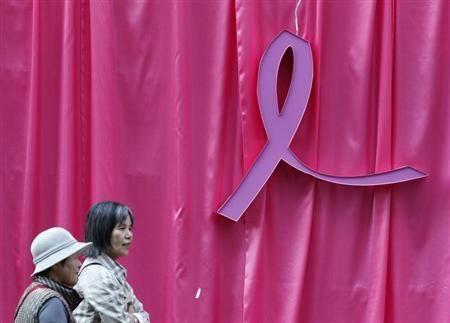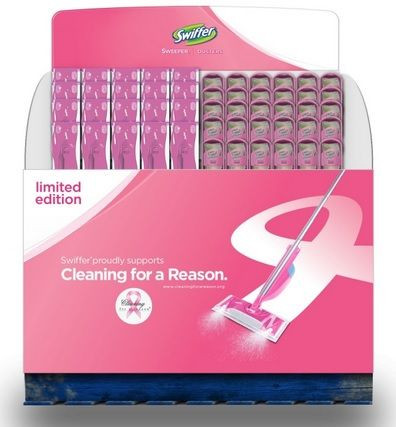Beyond Breast Cancer Awareness Month: Chemical Pinkwashing Persists During October’s Ribbon Ruse

You’re probably aware that October is National Breast Cancer Awareness Month, but here’s something you might not know. Breast Cancer Awareness Month was originally cooked up as a corporate marketing blitz by Imperial Chemical Industries, now part of the pharmaceutical giant AstraZeneca plc (NYSE:AZN). The company, at the time, had an obvious interest in reaching the marketplace: It sold both carcinogenic pesticides as well as numerous cancer-treating drugs.
“It was the perfect profit cycle,” said Karuna Jaggar, executive director of the nonprofit Breast Cancer Action. “They sold chemicals that cause the disease and then the treatments for the disease.”
Jaggar, a longtime research and policy advocate, is among the most vocal critics of “pinkwashing,” a type of marketing spin in which companies use the guise of breast cancer awareness to make a profit. Pink vodkas, pink pizza boxes, pink M&Ms -- they’re mostly meant to play on our sympathies and, in turn, tug on our wallets. Even that ubiquitous pink ribbon is a corporate concoction, a collaboration between Self magazine and the cosmetics firm Estée Lauder Companies Inc. (NYSE:EL), which coopted the idea from a breast cancer survivor in the early 1990s. Twenty years onward, there’s a reason the symbol is still in use all over the world: As a form of branding, it works.
“It’s arguably the most successful marketing campaign of the 20th century, and it does tend to get a pass,” Jaggar said. “People see pink ribbons on products and they automatically think something good is going to come from that purchase.”
Contrary to that belief, Jaggar said money spent on pink products often never sees the inside of a cancer research facility or prevention program. She said consumers confronted with pink promotions need to be discerning, do research and ask questions before they plunk down cash. Does an acceptable percentage of the proceeds go to a breast cancer organization? If so, which one? She added that, frequently, corporate awareness campaigns will have caps, meaning that once they raise a certain amount for the charity, the rest ends up lining companies’ pockets.
Jaggar also cited what she calls “more egregious” forms of pinkwashing: “companies that are selling products in the name of breast cancer and yet those very products contain the chemicals that are linked to an increased risk of the disease.” Such pinkwashing can include anything from a local BMW dealer using the pink ribbon to drive up car sales, to cosmetics companies like Avon Products Inc. (NYSE:AVP), which routinely run aggressive pink-ribbon campaigns in October.
In one recent example, the website Jezebel called out Cleaning for a Reason, a nonprofit that provides maid services for women undergoing treatment for cancer. The nonprofit recently teamed up with the Swiffer unit of the Procter & Gamble Company (NYSE:PG) for a campaign that includes pink-colored Swiffer cloths, which Jezebel said contain various questionable chemicals.
Ian Tholking, a spokesman for Procter & Gamble, downplayed the pinkwashing charge, saying that Swiffer products are safe for use as intended and compliant with pertinent regulations. “I can assure you that safety is at the heart of everything we do,” he said. “We ensure our products are safe for their intended use from the first stage of their development, long before they even go to market.”

While companies may say they guarantee their products’ safety, Jaggar said they are not required to by law to do so -- and that’s part of the problem. The 1976 Toxic Substances Control Act, which regulates chemical safety, is significantly out of date. Reform legislation is being proposed, but she said it will be a toothless fix unless it shifts the burden of proof to chemical manufacturers. “We have to stop assuming that all chemicals are innocent until proven guilty and require industry to demonstrate chemical safety,” she said.
In the meantime, Jaggar said Breast Cancer Action will keep fighting the fight it jumped into more than a decade ago, when it launched the “Think Before You Pink” project and coined the term “pinkwashing.” She said she’s seen a huge shift in the public dialogue since then, and she’s optimistic that more and more people will begin to think about breast cancer funding in a different way. Despite the effectiveness of that pink ribbon, she said there’s more to fighting a disease than being aware of it.
“What do we have with all this awareness?” Jaggar said. “We have a lot of misconceptions. Do we need more awareness or do we need some real action?”
Got a news tip? Email me. Follow me on Twitter @christopherzara
© Copyright IBTimes 2025. All rights reserved.






















